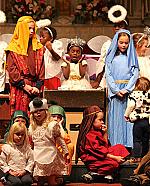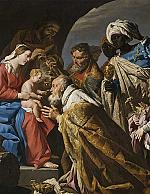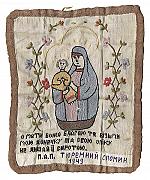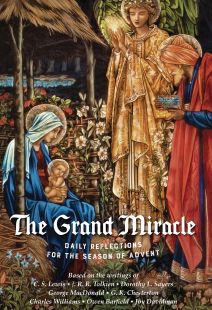Day 25. Wait for the Lord

[above: Gifts to be opened Christmas Day Photo by Nathan Lemon on Unsplash]
Wait for the Lord; be strong and take heart and wait for the Lord. (Psalm 27:14, NIV)
It is the very essence of a festival that it breaks upon one brilliantly and abruptly. . . . it is essential that there should be a clear black line between it and the time going before. And all the old wholesome customs in connection with Christmas were to the effect that one should not touch or see or know or speak of something before the actual coming of Christmas Day.
—G. K. Chesterton, Illustrated London News, January 12, 1907
The liturgical color for Advent is the same as for Lent. Purple is not the Christian symbol of royalty but of what Martin Luther called the heart bruised beneath the millstone. “The human heart is like a millstone in a mill,” said Luther; “when you put wheat under it, it turns and grinds and bruises the wheat to flour; if you put no wheat, it still grinds on, but then ’tis itself it grinds and wears away.” Advent calls us to let God pulverize the poor wheat of our sinful and errant lives, turning it into the flour that becomes nourishing bread for others. Without a penitent Advent, Christmas is an empty jollity, a grinding of ourselves back into dust, into nothing.
Chesterton’s insistence on the “clear black line” also keeps time itself from becoming homogeneous, a mere succession of one thing after another, with no moment or event to be set apart and honored for its own unique significance. Our refusal to make such clear temporal demarcations is everywhere evident. All Hallows’ Eve bleeds back into September, Christmas begins even before Thanksgiving has arrived, and Advent is lost altogether.
We will not wait upon the Lord. We want everything, even holy things, to happen now and not later. Living by chronos (clock time) rather than kairos (holy time), even Christians become a hurried and harried and impatient people. The Christian year teaches us how to mark clear lines, how to wait, and thus how to celebrate. Its sharply drawn seasons serve to renarrate the entire Christian story. It enables us to live according to God’s own calendar: from Advent to Christmas, on to Epiphany and Lent, finally to Easter and Pentecost. Let all heaven and earth rejoice, therefore, when we cross the clear black line at midnight on Christmas Eve and not a minute before!
PRAYER: Help us to wait patiently and penitently for your coming, O Lord, so that we might be transformed into humble loaves of bread whose wheat and leaven come from you, the Bread of Life. Amen.
By Ralph Wood
[Christian History originally published this article in Christian History Issue #133+ in 2019]
Ralph Wood teaches Christian theology in relation to literary texts at Baylor University in Waco, Texas.Next articles
Day 27. The Drama of the Incarnation
“After studying medieval drama I can believe that Jesus still loves me.”
Crystal DowningSupport us
Christian History Institute (CHI) is a non-profit Pennsylvania corporation founded in 1982. Your donations support the continuation of this ministry
Donate







